Preventing Processed Food Addiction from Baby's First Bites with Joan Ifland, PhD
- Why processed food addiction occurs and what we can do to prevent it from baby's first bites
- Tips for dealing with overwhelm when faced with food purchase decisions at the grocery store
- How to make peace with the presence of processed foods in our family food supply especially when they are marketed to babies
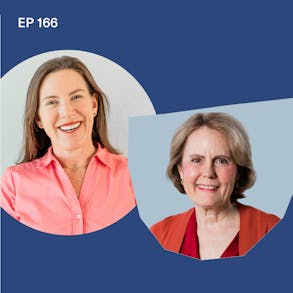
LISTEN TO THIS EPISODE
Episode Description
Can you become addicted to processed foods? Dr. Ifland is the world’s leading expert in processed food addiction & the co-Author of the textbook Processed Food Addiction: Foundations, Assessment & Recovery. Today’s guest, Dr. Joan Ifland speaks to us about processed food addiction while sharing her own experience.
About the Guest
- With the publication of her textbook, Processed Food Addiction, Dr. Ifland is considered to be the world's leading expert in processed food addiction. Dr. Ifland has spent years of her research dedicated to the development of food addiction, how to combat food addiction, and how restrictive dieting relates to food addiction.
Links from this Episode
- Dr. Ifland’s website https://www.drjoanifland.com/ and her Food Addiction Reset community page is here https://www.foodaddictionreset.com/
- Dr. Ifland’s Facebook Group Food Addiction Education can be accessed here
- Get Dr. Ifland’s textbook Processed Food Addiction on Amazon here (this is an affiliate link)
- Baby-Led Weaning with Katie Ferraro program with the 100 First Foods™ Daily Meal Plan, join here: https://babyledweaning.co/program
- Baby-Led Weaning for Beginners free online workshop with 100 First Foods™ list to all attendees, register here: https://babyledweaning.co/baby-led-weaning-for-beginners
Other Episodes Related to this Topic

Latest Episodes
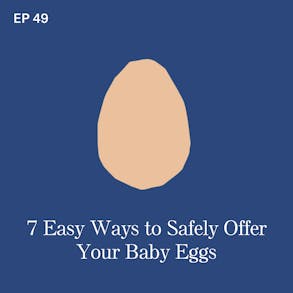

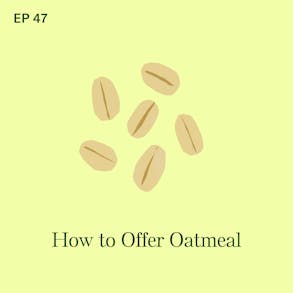
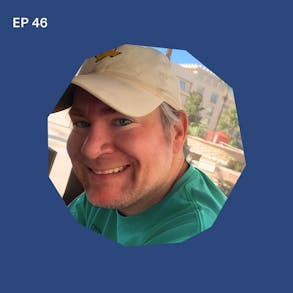
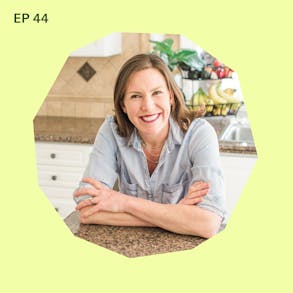
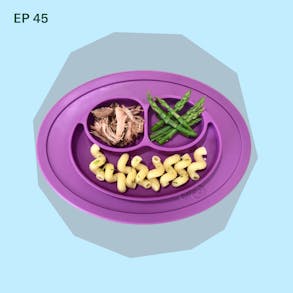
Joan Ifland (1s):
Something that parents can really do to help their children is sit down, eat three meals and a snack. If you need one regular times throughout the day, and don't eat between meals
Katie Ferraro (16s):
Hey there! I'm Katie Ferraro, registered dietitian, college nutrition, professor and mama of seven specializing in baby led weaning here on the baby led weaning made easy podcast. I help you strip out all of the noise and nonsense about feeding, leading you with the competence and knowledge. You need to give your baby a safe start to solid foods using baby led weaning. Hey guys, welcome back. So have you ever heard anybody say that they're addicted to food? Like, is that a real thing? Can you be addicted to food? And since we're in the business of talking about feeding our Babies, what are the things that we might be doing right now that could eventually cause our babies to be addicted to food?
Katie Ferraro (59s):
Well, I don't know the answers to these questions, which is exactly why I invited today's guest on to talk about Preventing Processed Food Addiction from our babies first Bites. And my guest today is Dr. Joan Ifland. She is the world's leading expert in processed food addiction. She's a coauthor of a textbook called process food addiction, Foundations, assessment, and Recovery, serious stuff. She runs a recovery program. She has a PhD in interdisciplinary studies, a specialty in addictive nutrition. So this is really kind of her wheelhouse. And as a mom of seven small kids, I am a firm believer that you cannot take care of other people if you are not taking care of yourself.
Katie Ferraro (1m 44s):
So some of what we're going to talk about in today's interview will be the things even prior to birth that could be possibly setting the stage for babies to be addicted to certain types of foods and the unhelpful ones in processed foods. But also what are some of the practices that we might be engaging in that we're not even aware of as parents right now that we could tweak or alter to help our babies establish a helpful relationship with food? So with no further ado, I want to introduce you guys to Dr. Joan Ifland in our interview talking about how to prevent processed food addiction from your babies, the first Bites. Well, hi, Dr. Ifland. Thank you so much for joining me on the podcast today,
Joan Ifland (2m 23s):
Katie, thanks for having me. Your
Katie Ferraro (2m 26s):
Background as an expert in food addiction is not like run of the mill. This is pretty unusual. Can you tell us a little bit about your professional history and how did you come to work in this unique corner of food and nutrition?
Joan Ifland (2m 37s):
Well, I have an MBA from Stanford. My undergraduate degree is in economics and political science. And then my PhD is in addictive nutrition. And you might wonder how all of those things tie together. And what we have evidence for is that processed food addiction was started by corporations. So it's a business practice. There is a business model called the addiction business model. It's used by anybody who's selling an addictive product like alcohol, like cigarettes, like vaping like cannabis, even the pharmaceuticals, who's this model to sell opiates to doctors.
Joan Ifland (3m 18s):
So it's a known business model. And so having a business background really helped me see what was going on with the corporations. As soon as I finished my PhD and I began to see parallels between the tobacco industry and the processed food industry. And I remembered that the tobacco industry bought Kraft Nabisco and general foods in three years in the mid 1980s and the obesity epidemic came out of that. Then I began to see what we needed to do in order to get out from under This is overeating and then writing the textbook.
Joan Ifland (4m 0s):
I wrote the textbook for the field process, food addiction, and that really sealed the deal I could see in the research. The scientists were discovering that chronic Overeaters have the same brain changes as people who were using addictive drugs. That's why having a undergraduate degree in economics and political science and an MBA. And this PhD in addictive nutrition all fits together.
Katie Ferraro (4m 30s):
So our audience consists primarily of parents and caregivers of babies who are just starting the transition to solid foods. At around six months of age, I teach in alternative to traditional spoonfeeding. It's called baby led weaning. And one of the benefits of baby led weaning is that it helps babies establish a helpful relationship with food from his or her first Bites. So I was curious if you could give us some insight into what causes food addiction later on in life, just so we can be aware of what practices to avoid as we're learning, to feed our babies.
Joan Ifland (5m 0s):
We have really interesting evidence about breastfeeding. If a mother is eating sugar, there is a higher sugar content and breast milk, and you can start to addict a baby even while still at the breast. If that breast milk is giving that baby a high, because the sugar concentration is higher than that, baby's brain is already developing the cycle of a high and a crash. And then cravings. We have evidence that if the mother's eating sugar, the baby will feed longer at the breast. And we have some evidence that babies can be even addicted in utero.
Joan Ifland (5m 43s):
So if both parents are eating processed foods and their genes are replicating in an addictive way, then the very first cell of that new baby has that genetic propensity. Now the good news I want to rush to the goodness is that even if that happened, environment is going to keep the addictive genes turned on. And if you can control the environment, then that's not a sentence. It's not a life sentence to be conceived with genes that are replicating addictively. So this is all good news. Mothers who are eating a non-addictive and food plan are going to be creating brain chemicals, particularly in the reward centers that are not addicted.
Joan Ifland (6m 29s):
That's step number one is to be eating an unprocessed clean food plan yourself during breastfeeding.
Katie Ferraro (6m 36s):
What about after? So Baby, six months of age, what are some things that we might not even be aware of that might possibly be contributing to
Joan Ifland (6m 44s):
Food addiction? So surprisingly the messaging and the environment babies have food seeking brains, the way we all do. So if you put a provocative process, food related messaging in that environment, then even that baby's brain as it's developing is getting addictive programming. So the messaging inside the household turns out to be crucial. Number two is availability in the household. So if there are processed foods widely available in the household, and that baby sees the adults or older children eating processed foods, that baby has a system in its brain called mirror neurons.
Joan Ifland (7m 32s):
They're copying, they're watching, watching, watching, copying, copying, copying. So what the baby sees, other people eating has an impact.
Katie Ferraro (7m 41s):
Most of our listeners out there are moms and many moms in our community will readily confess that they do not personally have the best relationship with food. And then they'll share that they don't want to recreate their same food issues and problems in their babies. So I was curious if you had any tips for moms who may be struggling with food addiction themselves, and how can they help prevent the same outcomes in their baby?
Joan Ifland (8m 6s):
I understand this entirely because I, my two babies were born just a yearpart. Two pregnancies back to back. I was slightly food addicted before these two pregnancies. And I remember when I got pregnant, my first thought was finally, I can eat whatever I want, and that was not true. But for my whole life I had struggled with, I shouldn't eat that. I'm not going to eat that. And only going to have so much so that I had a weight problem, my first year of college. And then I had a weight problem after my two pregnancies. So I was pregnant for almost two years straight.
Joan Ifland (8m 46s):
And I think what happened is during the pregnancy is my food addiction accelerated because I wasn't concerned about quantities. I was eating as much as I wanted. So when the children were delivered and growing up, I started yo-yo dieting to get my figure back. And there is something called breastfeeding bulemia where mothers are trying to get their figures back there. They don't eat enough to maintain their body weight. They want to lose weight and they're using breastfeeding to lose weight, to set up for that yo-yo dieting.
Joan Ifland (9m 26s):
So we have the addiction, we also develop food seeking. So the worst thing that you can do to lose weight is to not eat enough. You will develop a second problem, which is a hyperactive food seeking brain. And we have really good research on this. Eric Stice of Stanford has done studies where he's taking data from two groups. One group was fasting. The other group was dieting. And then of course, a group of people who were not doing either, he put the data away and waited five years. And sure enough, the people who had been dieting and fasting, not eating enough, had developed eating disorders.
Joan Ifland (10m 7s):
They were binge-eating or they had bulemia. And that is just an indication that the food seeking brain has been woken up. So you want to avoid that entirely. Something that parents can really do to help their children is sit down, eat three meals and a snack. If you need one regular times throughout the day, and don't eat between meals, eat enough food at the meal to really keep you from being hungry for four or five hours until the next meal and get an incredible life. You get this nice, clear head. You get lots of energy. You're down on the floor with your kids and having a great time with them.
Joan Ifland (10m 49s):
You can pay attention. You can connect with them. This is a gift. I didn't have it. I didn't find out about this until my girls were 11 and 12 years old. I kind of missed their baby years cause I was so preoccupied with food, but now I have grandchildren and I am amazed. I could sit there for two hours or four hours and play games with them and do projects with them and get out all these fun toys and actually engage with them. That's something that I couldn't do with my own children.
Katie Ferraro (11m 21s):
So you've also done a lot of work in the area of processed food addiction and our mutual friend and colleague Dr. Robert Lustig. He was previously on the podcast here talking about sugar and why your babies should avoid it. And I think a lot of parents are surprised how much added sugar is even in the foods products that are directly marketed to babies. Even though everybody knows babies should not eat food with added sugar. So could you talk a little bit about the addictive components of processed foods that we should look to avoid when feeding our babies, like obviously added sugars is one of them, but what are some, maybe the less obvious ones we might not be aware of?
Joan Ifland (11m 54s):
Another a and this addiction business model is to attack the youngest possible user. And that is a newborn and baby formula has 50, 52% corn syrup solids ensure these corporations don't care. An addicted baby is just fine with them. So I would encourage everybody to make their own baby food to cook it. And until your baby can eat it and do not puree it, do not put it in a blender, do not put it in a food processor. Those cut the walls of the cells and your baby will absorb that too quickly, whatever you need to do to get that, to be palatable to your baby, but to not puree it
Katie Ferraro (12m 41s):
Well, Dr. Ifland thank you so much for all of your insight. Please tell us where can our audience go to learn more about you and your work in your,
Joan Ifland (12m 48s):
We are at processtoaddiction.com. We do have recovery programs. Your members don't have to struggle if they think they have food addiction, or they're not sure we have a self quiz at processed food addiction that will help them determine if they are addicted.
Katie Ferraro (13m 6s):
Well, thank you so much. Yay.
Joan Ifland (13m 8s):
Thank you.
Katie Ferraro (13m 10s):
Well, I hope you guys enjoyed that interview with Dr. Joan Ifland. She is the world's leading expert in processed food addiction. And I'm going to go ahead and link to many of the resources that she mentioned in today's episode, in the event that you are interested in learning more. You can find those. If you go to BLW podcast.com forward slash/166, thank you so much for listening and I'll catch you guys next time.

The Program Baby-Led Weaning with Katie Ferraro
A step-by-step digital program for starting solid foods safely and navigating the original 100 FIRST FOODS™ meal plan with baby-led weaning.
 EXPERT-LED, PROVEN APPROACH TO EATING REAL FOOD
EXPERT-LED, PROVEN APPROACH TO EATING REAL FOOD CONCISE VIDEO TRAININGS TO MASTER BABY-LED WEANING
CONCISE VIDEO TRAININGS TO MASTER BABY-LED WEANING 100 FIRST FOODS DAILY MEAL PLAN WITH FOOD PREP VIDEOS
100 FIRST FOODS DAILY MEAL PLAN WITH FOOD PREP VIDEOS
Baby-Led Weaning for Beginners Free Workshop
Is your baby ready to start solid foods, but you’re not sure where to start? Get ready to give your baby a solid foundation to a lifetime of loving real food…even if you’re feeling overwhelmed or confused about this next stage of infant feeding.
Get baby-led weaning recipes and tips delivered to your email inbox.

